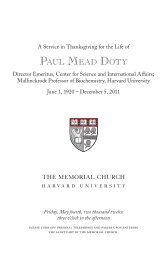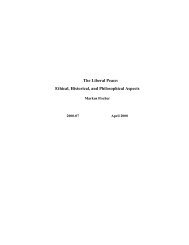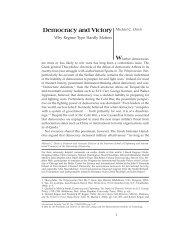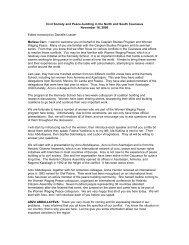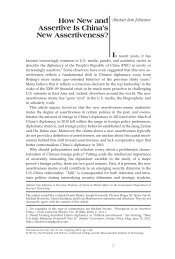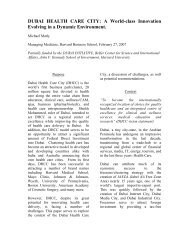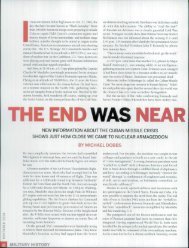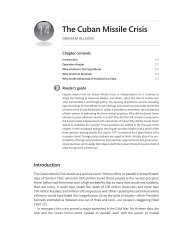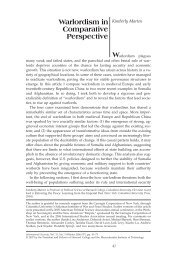The Cuban missile crisis and intelligence performance
The Cuban missile crisis and intelligence performance
The Cuban missile crisis and intelligence performance
Create successful ePaper yourself
Turn your PDF publications into a flip-book with our unique Google optimized e-Paper software.
Downloaded by [Harvard College] at 08:23 18 September 2012<br />
206 INTELLIGENCE AND THE CUBAN MISSILE CRISIS<br />
people who are tightly wedded to their beliefs, <strong>and</strong> people who are<br />
relatively more open to the possibility that their beliefs <strong>and</strong> assumptions<br />
may be wrong, or who appreciate the potential explanatory power of two or<br />
more different sets of beliefs <strong>and</strong> assumptions. 101<br />
Intelligence analysis can never transcend its dependence upon prior<br />
assumptions <strong>and</strong> beliefs. Underst<strong>and</strong>ing presupposes them. Yet at the same<br />
time, underst<strong>and</strong>ing must always, to some extent, be frustrated by them. All<br />
<strong>intelligence</strong> communities would like to minimize the frustration, <strong>and</strong> to tip<br />
the balance between knowledge of self <strong>and</strong> knowledge of other in the<br />
direction of the latter. As a practical matter, though, how do <strong>intelligence</strong><br />
analysts avoid tripping over their prior assumptions <strong>and</strong> beliefs without<br />
being paralyzed by ambiguity <strong>and</strong> indecision? How do they steer between<br />
the Scylla of overcommitment, <strong>and</strong> the Charybdis of uncertainty ('an open<br />
mind is an empty mind')? 102 Scholars <strong>and</strong> practitioners have been very<br />
creative in proposing solutions, but, as Berts effectively demonstrates, the<br />
most prominent ones — assuming the worst, multiple advocacy,<br />
consolidation, Devil's advocacy (e.g., 'Team B' exercises), sanctions <strong>and</strong><br />
incentives, <strong>and</strong> 'cognitive rehabilitation <strong>and</strong> methodological consciousness'<br />
- all face important obstacles or have serious defects. 103 Betts is certainly<br />
correct that <strong>intelligence</strong> failures are inevitable, <strong>and</strong> he rather pessimistically<br />
concludes that the inherent limits of <strong>intelligence</strong> assessment suggest that we<br />
are unlikely to realize more than marginal benefits from procedural<br />
innovation.<br />
Fatalism may be entirely appropriate - if we insist upon thinking of<br />
'better' <strong>intelligence</strong> as an improvement in some rate of success, or as a<br />
purely intellectual measure of the accuracy of an <strong>intelligence</strong> community's<br />
judgments of an adversary. But we may be able to improve the effectiveness<br />
of <strong>intelligence</strong> quite dramatically simply by keying on possible sources of<br />
intellectual error. If <strong>intelligence</strong> failures are inevitable, why not exploit that<br />
fact when attempting to serve policy?<br />
Because <strong>intelligence</strong> assessment is so heavily dependent upon<br />
assumptions <strong>and</strong> specific modes of inference, it st<strong>and</strong>s to reason that if<br />
policy makers were more fully aware of them, they would be better able to<br />
read, underst<strong>and</strong>, <strong>and</strong> make use of <strong>intelligence</strong>. National leaders are often<br />
sophisticated analysts in their own right, who operate on the basis of certain<br />
assumptions about the world, <strong>and</strong> who draw their own conclusions on the<br />
basis of their own beliefs. <strong>The</strong>re is ample evidence of this on all sides in the<br />
<strong>Cuban</strong> <strong>missile</strong> <strong>crisis</strong>, certainly, although of the three leaders Khrushchev<br />
appears to have relied upon his own analysis most heavily, <strong>and</strong> Kennedy<br />
least. But all leaders are, to some extent, their own analysts, <strong>and</strong> are<br />
therefore confronted with the task of having to make sense of <strong>intelligence</strong><br />
assessments which may or may not reinforce their own expectations. Some



